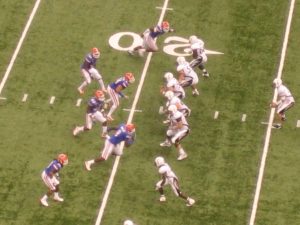A few weeks ago I had the pleasure of attending a panel at Silicon Valley Comic Con consisting of various members of the cast of the television show Star Trek: The Next Generation. Brent Spiner, Gates McFadden, Jonathan Frakes, Denise Crosby, Marina Sirtis and Robert O'Reilly were joined by original series cast member William Shatner to talk about the show, their lives as actors, and what the Star Trek universe has taught and can teach us about the real world.
Star Trek cast on lessons to learn from that universe to improve our own: cultural diversity, respecting facts/science, caring for the Earth pic.twitter.com/zb9XdvlUVs
— Chris Hardie (@ChrisHardie) April 22, 2017
For someone who watched every episode of the show when it originally aired and who has remained a fan since, it was an hour and a half of nearly pure joy. For one, I was just excited to be a part of a whole auditorium full of people reflecting on how much influence the stories, dialogue and creativity of the show had on our lives, the panelists included. Several audience members stood up to say just how strong that influence has been, informing the careers they chose, the people they've become, the kind of lives that they now lead, and I was right there with them.
In watching Star Trek as a young person I remember being invigorated by the complex problem-solving scenarios that the Enterprise crew faced week after week. I learned from the principles of collaboration, mutual respect and cross-species equity that were practiced. I saw strong women in leadership roles, and I saw non-Caucasian characters developed with an unusual (for mainstream TV, anyway) depth and texture. And I was inspired by a vision of the future that offered so many possibilities for exploration, discovery and growth. I'm sure that my real-world evolution as technologist and computer geek was propelled forward significantly by my immersion in that make-believe world of technological wonders.
The panel also highlighted a new angle of my appreciation for the Star Trek universe. I hadn't previously thought about Trek as having a political point of view, because I assumed that the vision of a world where humanity had figured out how to eliminate poverty and hunger, celebrated and built on our various differences, and employed innovation to protect and restore the environment was a vision that anyone would embrace and want to strive for, and not a particularly politically-charged one.



